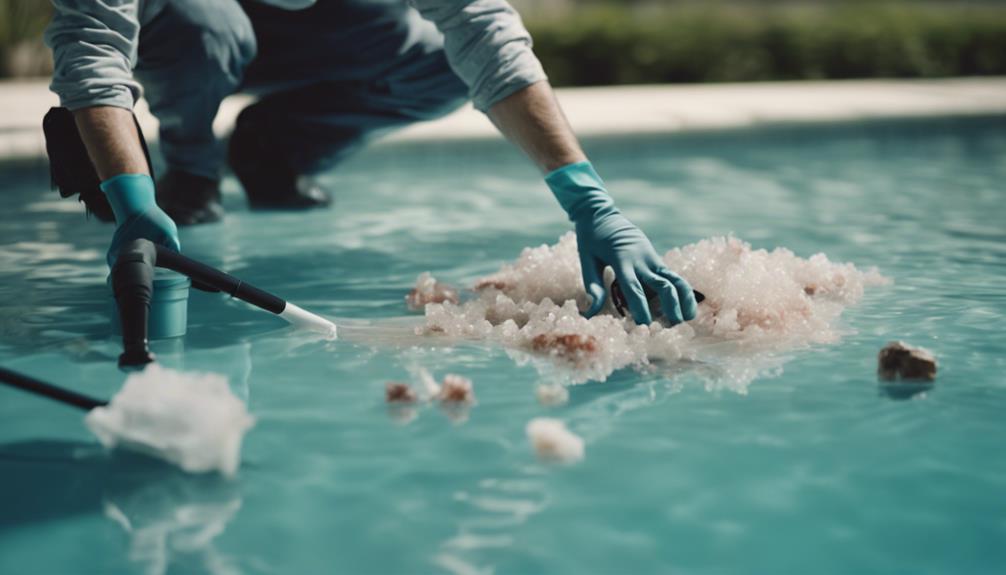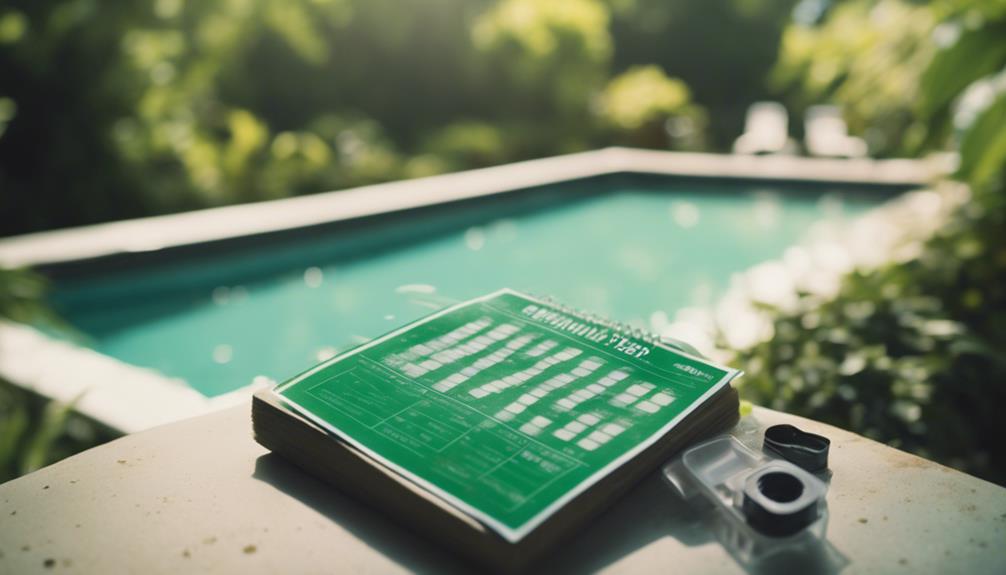To fix cloudy pool water, start by monitoring pH levels to guarantee balance. Clean the pool by skimming off floating debris and vacuuming. Use appropriate chemicals like chlorine and clarifiers for treatment, following instructions carefully. Maintain regular upkeep by monitoring pH and seeking professional help when necessary. These steps will help clear up your pool water efficiently.
Key Takeaways
- Test and adjust pH levels regularly to maintain balance and prevent cloudiness.
- Clean and skim the pool frequently to remove debris and enhance filtration.
- Use proper chemical treatments like shock and clarifiers to improve water clarity.
- Follow a consistent maintenance routine including vacuuming and filter cleaning.
- Seek professional advice for persistent cloudy water issues.
Understanding Cloudy Pool Water Causes
Understanding the causes of cloudy pool water is vital for maintaining a safe and enjoyable swimming environment. Cloudiness can result from various factors such as rainwater introducing contaminants, outdoor debris entering the pool, or even algae growth due to inadequate sanitation.
One common cause of cloudy water is an imbalance in pH levels, with the ideal range for pools being around 7.6. Regular monitoring of pH levels and the pool's filtration system is pivotal in preventing cloudiness.
Monitoring and Testing Pool Ph Levels
To maintain a clean and balanced swimming environment, it is crucial for pool owners to regularly monitor and test the pH levels of their pool water. The pH level indicates the acidity or alkalinity of the water, affecting the effectiveness of chlorine and overall water quality.
The ideal pH level for pools is around 7.6, slightly above neutral. Testing pool pH is typically done using pH strips, providing a quick and easy way to assess the water's chemical balance.
Monitoring the pH levels regularly allows for prompt adjustments to prevent imbalances that can lead to cloudy water, algae growth, and skin irritation. By staying on top of pH levels, pool owners can secure a safe and enjoyable swimming experience for all.
Cleaning and Skimming Pool Water

Regularly skimming and cleaning your pool water is essential for maintaining its clarity and cleanliness. Skimming helps remove debris floating on the surface, preventing it from sinking and causing cloudiness. Additionally, deep cleaning methods like vacuuming and scrubbing the pool walls can further enhance water clarity. Ensuring the pool filter is cleaned regularly is crucial for efficient water circulation and filtration. By incorporating these cleaning practices into your pool maintenance routine, you can prevent cloudy water and enjoy a sparkling pool all season long.
| Skimming | Vacuuming | Filter Cleaning |
|---|---|---|
| Removes floating debris | Cleans the pool floor | Enhances filtration |
| Prevents cloudiness | Improves water clarity | Ensures efficient circulation |
| Quick and easy method | Removes dirt and algae buildup | Prevents clogs and blockages |
Proper Chemical Treatment for Clarity
Maintaining clear pool water requires precise and attentive chemical treatment. To achieve ideal clarity, start by testing and balancing the pool's pH levels. Use pH increaser or decreaser to adjust levels as needed, aiming for around 7.6.
Regularly shock the pool to increase chlorine levels and combat bacteria and algae growth. Additionally, consider using clarifiers to help filter out fine particles that can cause cloudiness.
It's essential to follow product instructions carefully and use proper safety gear when handling pool chemicals. By implementing a consistent chemical treatment routine, you can enjoy a sparkling pool that is inviting and safe for swimming.
Regular Maintenance for Clear Water

Consistent upkeep of your pool is necessary to secure clear and welcoming water for safe swimming experiences. Regular upkeep tasks include skimming the pool surface to remove debris, vacuuming and scrubbing for deeper cleaning, and making sure the pool filter is cleaned regularly.
By staying on top of these maintenance activities, you can prevent the accumulation of contaminants that lead to cloudy water. Additionally, monitoring and adjusting the pool's pH levels, along with proper filtration, are vital elements of maintaining water clarity.
Seeking professional guidance when needed can help address any issues promptly and guarantee a safe swimming environment for you and your family. Remember, proactive and regular maintenance is key to keeping your pool water sparkling and inviting.
Frequently Asked Questions
How Often Should I Shock My Pool to Prevent Cloudy Water?
To prevent cloudy water, shock your pool weekly or after heavy use. Regular shocking helps maintain proper chlorine levels, combating algae and bacteria buildup. Consult a professional for personalized guidance on your pool's specific needs.
Can I Use Household Cleaning Products to Clean My Pool?
Household cleaning products are not recommended for pool maintenance. Improper chemicals can harm pool surfaces and alter water chemistry. Consult professional pool services for safe and effective cleaning methods. Prioritize pool health and safety.
Is It Safe to Swim in a Pool With Cloudy Water?
Swimming in a pool with cloudy water poses health risks due to potential bacteria growth. Cloudiness often indicates pH imbalance or inadequate filtration. Prioritize water clarity for safe swimming conditions. Regular maintenance and professional services guarantee pool safety.
Should I Drain My Pool Completely to Clear up Cloudy Water?
Draining a pool completely to clear up cloudy water is not always necessary. Instead, consider addressing factors like pH imbalance, debris, and filtration issues. Regular monitoring, cleaning, and professional maintenance services can effectively restore water clarity without resorting to draining.
Can Cloudy Pool Water Be a Sign of a Leak in the Pool?
Cloudy pool water can be a concern for pool owners, possibly indicating a leak. While various factors like pH imbalances and debris can cause cloudiness, it's important to inspect for leaks promptly to guarantee pool integrity and safety.
Conclusion
In the intricate dance of pool maintenance, ensuring crystal-clear water is akin to preserving a flawless symphony. By harmonizing pH levels, diligent cleaning, and strategic chemical treatments, pool owners can orchestrate a visual masterpiece that captivates all who behold it.
Embrace the role of a maestro in pool care, conducting the elements with precision and care to create a pool oasis that beckons with its clarity and allure.










